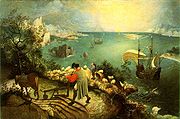
Musée des Beaux-Arts
Encyclopedia

W. H. Auden
Wystan Hugh Auden , who published as W. H. Auden, was an Anglo-American poet,The first definition of "Anglo-American" in the OED is: "Of, belonging to, or involving both England and America." See also the definition "English in origin or birth, American by settlement or citizenship" in See also...
from 1938. The poem's title derives from the Musées Royaux des Beaux-Arts de Belgique in Brussels
Brussels
Brussels , officially the Brussels Region or Brussels-Capital Region , is the capital of Belgium and the de facto capital of the European Union...
which contains the painting Landscape with the Fall of Icarus
Landscape With The Fall of Icarus
Landscape with the Fall of Icarus is a painting in oil on canvas long thought to be by Pieter Bruegel, although following technical examinations in 1996, that attribution is regarded as very doubtful, and it is now seen as a good early copy by an unknown artist of Bruegel's original, perhaps...
, thought until recently to be by Pieter Brueghel the Elder
Pieter Brueghel the Elder
Pieter Bruegel the Elder was a Flemish renaissance painter and printmaker known for his landscapes and peasant scenes . He is sometimes referred to as the "Peasant Bruegel" to distinguish him from other members of the Brueghel dynasty, but he is also the one generally meant when the context does...
, though still believed to be based on a lost original of his.
"Brueghel's" painting portrays several men and a ship peacefully performing daily activities in a charming landscape
Landscape
Landscape comprises the visible features of an area of land, including the physical elements of landforms such as mountains, hills, water bodies such as rivers, lakes, ponds and the sea, living elements of land cover including indigenous vegetation, human elements including different forms of...
. While this occurs, Icarus
Icarus (mythology)
In Greek mythology, Icarus is the son of the master craftsman Daedalus. The main story told about Icarus is his attempt to escape from Crete by means of wings that his father constructed from feathers and wax...
is visible in the bottom right hand corner of the picture, his legs splayed at absurd angles, drowning in the water.
The allusions in the first part of the poem to a "miraculous birth" and a "dreadful martyrdom" refer obliquely to Christianity
Christianity
Christianity is a monotheistic religion based on the life and teachings of Jesus as presented in canonical gospels and other New Testament writings...
, the subject of other paintings by Breughel in the museum that the poem evokes (e.g. "The Census at Bethlehem
Bethlehem
Bethlehem is a Palestinian city in the central West Bank of the Jordan River, near Israel and approximately south of Jerusalem, with a population of about 30,000 people. It is the capital of the Bethlehem Governorate of the Palestinian National Authority and a hub of Palestinian culture and tourism...
" and "The Massacre of the Innocents"). The "forsaken cry" of Icarus alludes to Christ
Christ
Christ is the English term for the Greek meaning "the anointed one". It is a translation of the Hebrew , usually transliterated into English as Messiah or Mashiach...
crying out on the cross, "My God, why hast thou forsaken me?"
Some years after Auden wrote this poem, William Carlos Williams
William Carlos Williams
William Carlos Williams was an American poet closely associated with modernism and Imagism. He was also a pediatrician and general practitioner of medicine, having graduated from the University of Pennsylvania...
wrote a poem titled "Landscape with the Fall of Icarus
Landscape with the Fall of Icarus (poem)
Landscape with the Fall of Icarus is an ecphrastic poem by the 20th-century American poet William Carlos Williams that was written in response to Landscape with the Fall of Icarus, traditionally attributed to Pieter Bruegel...
" about the same painting.

